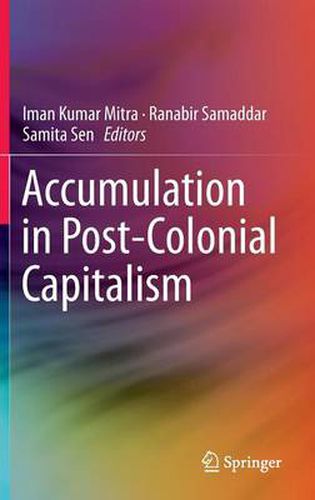Readings Newsletter
Become a Readings Member to make your shopping experience even easier.
Sign in or sign up for free!
You’re not far away from qualifying for FREE standard shipping within Australia
You’ve qualified for FREE standard shipping within Australia
The cart is loading…






This title is printed to order. This book may have been self-published. If so, we cannot guarantee the quality of the content. In the main most books will have gone through the editing process however some may not. We therefore suggest that you be aware of this before ordering this book. If in doubt check either the author or publisher’s details as we are unable to accept any returns unless they are faulty. Please contact us if you have any questions.
This volume looks at how accumulation in postcolonial capitalism blurs the boundaries of space, institutions, forms, financial regimes, labour processes, and economic segments on one hand, and creates zones and corridors on the other. It draws our attention to the peculiar but structurally necessary coexistence of both primitive and virtual modes of accumulation in the postcolony. From these two major inquiries it develops a new understanding of postcolonial capitalism. The case studies in this volume discuss the production of urban spaces of capital extraction, institutionalization of postcolonial finance capital, gendering of work forms, establishment of new forms of labour, formation of and changes in caste and racial identities and networks, and securitization-and thereby confirm that no study of contemporary capitalism is complete without thoroughly addressing the postcolonial condition.
By challenging the established dualities between citizenship-based civil society and welfare-based political society, exploring critically the question of colonial and postcolonial difference, and foregrounding the material processes of accumulation against the culturalism of postcolonial studies, this volume redefines postcolonial studies in South Asia and beyond. It is invaluable reading for students and scholars of South Asian studies, sociology, cultural and critical anthropology, critical and praxis studies, and political science.
$9.00 standard shipping within Australia
FREE standard shipping within Australia for orders over $100.00
Express & International shipping calculated at checkout
This title is printed to order. This book may have been self-published. If so, we cannot guarantee the quality of the content. In the main most books will have gone through the editing process however some may not. We therefore suggest that you be aware of this before ordering this book. If in doubt check either the author or publisher’s details as we are unable to accept any returns unless they are faulty. Please contact us if you have any questions.
This volume looks at how accumulation in postcolonial capitalism blurs the boundaries of space, institutions, forms, financial regimes, labour processes, and economic segments on one hand, and creates zones and corridors on the other. It draws our attention to the peculiar but structurally necessary coexistence of both primitive and virtual modes of accumulation in the postcolony. From these two major inquiries it develops a new understanding of postcolonial capitalism. The case studies in this volume discuss the production of urban spaces of capital extraction, institutionalization of postcolonial finance capital, gendering of work forms, establishment of new forms of labour, formation of and changes in caste and racial identities and networks, and securitization-and thereby confirm that no study of contemporary capitalism is complete without thoroughly addressing the postcolonial condition.
By challenging the established dualities between citizenship-based civil society and welfare-based political society, exploring critically the question of colonial and postcolonial difference, and foregrounding the material processes of accumulation against the culturalism of postcolonial studies, this volume redefines postcolonial studies in South Asia and beyond. It is invaluable reading for students and scholars of South Asian studies, sociology, cultural and critical anthropology, critical and praxis studies, and political science.